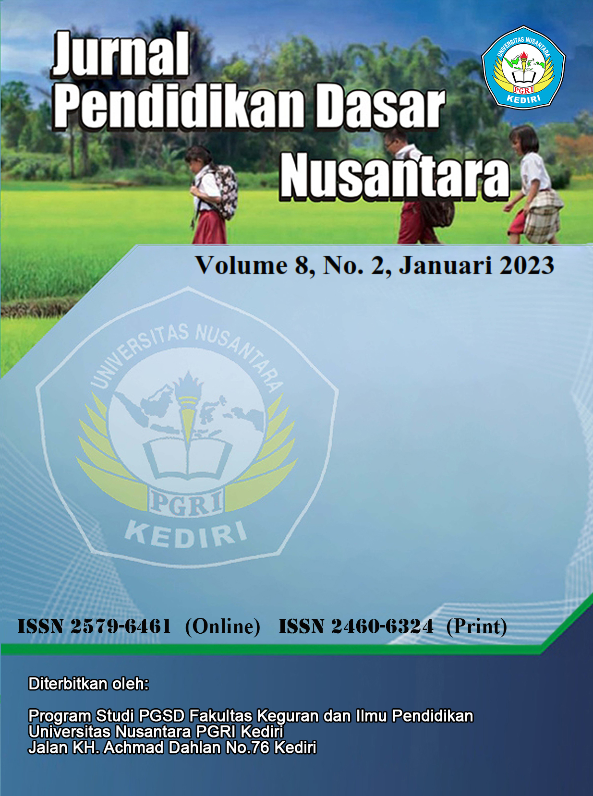Teachers' efforts to improve discipline of elementary school students using positive reinforcement methods in online learning
DOI:
https://doi.org/10.29407/jpdn.v8i2.19118Keywords:
student discipline, positive reinforcement, elementary schoolAbstract
: Discipline is an attitude that students need to have in learning in order to help students achieve learning goals. On the other hand, learning aims to train discipline so that students can behave correctly and have good character in society. This study aims to examine teachers' efforts to use positive reinforcement in increasing student discipline in the learning process. The research method used is descriptive qualitative. The data found by the author shows that the percentage of discipline in grade IV elementary school students is 63.2%. The teacher applies a positive reinforcement method that aims to improve student discipline. The use of positive reinforcement methods shows an increase in student discipline to 73.3%. The teacher has a role as a role model and guide in building student character. The conclusion obtained is that positive reinforcement shows the percentage of success of positive reinforcement on student discipline of 10.1%. The advice given is to make more specific disciplinary indicators and research is carried out over a longer period of time so that discipline improvements are more visible.
Downloads
References
Al, S., Havi, M., & Wardani, I. S. (2022). Character Education of Elementary School. 7(2), 244–256.
Anggito, A., & Setiawan, J. (2018). Metodologi penelitian kualitatif. CV. Jejak.
Anggraini, S., Siswanto, J., & Sukamto. (2019). Analisis dampak pemberian reward and punishment bagi siswa SD Negeri Kaliwiru Semarang. Jurnal Mimbar PGSD Undiksha, 7(3), 221–229.
Febianti, Y. N. (2018). Peningkatan motivasi belajar dengan pemberian reward and punishment yang positif. Jurnal Edunomic, 6(2), 93–102.
Gultom, L., & Siahaan, M. F. (2016). Penerapan Reward dan Konsekuensi untuk Meningkatkan Kedisiplinan Siswa Kelas II SD Sekolah Kristen ABC. Polyglot: Journal of Language, Literature, Cullture, and Education, 12(2), 100–116. https://ojs.uph.edu/index.php/PJI/article/view/368/163
Jainuddin, Salim, S., & Sirajuddin. (2020). Pengaruh minat dan kedisiplinan siswa dengan gaya kognitif Field Indefendent terhadap hasil belajar Matematika siswa SMK Farmasi Yamasi Makassar. Delta-Pi: Jurnal Matematika Dan Pendidikan Matematika, 9(2), 120–131. https://doi.org/E-ISSN : 2541-2906
Koesoema, D. (2007). Pendidikan karakter. Gramedia Widiasarana Indonesia.
Krisdianti, B., & Yoedo, Y. C. (2021). Penerapan Disiplin Positif Oleh Guru Dengan Integrasi Iman Kristen Pada Kelas I-a Di Sekolah Dasar X Surabaya. Aletheia Christian Educators Journal, 2(1), 1–23. https://doi.org/10.9744/aletheia.2.1.1-23
Naibaho, O. (2017). Pemberian Penguatan Positif oleh Guru dalam Upaya Meningkatkan Motivasi Belajar SIswa Pada Kompetensi Dasar Hubungan Satuan Panjang Pelajaran Matematika Kelas 1 SDN 060819 Medan Kota. Elementary School Journal, 7(4), 576–587.
Nursetya, B. S., & Kriswanto, E. S. (2014). Upaya meningkatkan kedisiplinan siswa kelas X Sma Negeri 1 Wates dalam mengikuti pembelajaran penjasorkes melalui reinforcement (penguatan). Jurnal Pendidikan Jasmani Indonesia, 10(2), 8–12.
Prijanto, J. H., & Gulo, A. J. (2018). Penerapan Positif dan Negatif untuk Meningkatkan Kedisiplinan Siswa SMP Lentera Harapan Lampung Tengah Mapel IPS. Jurnal Teori Dan Praksis Pembelajaran IPS, 3(1), 53–58. https://doi.org/10.17977/um022v3i12018p053
Purwanto. (2007). Pengaruh Konsekuensi Perilaku dan Motivasi Belajar terhadap hasil Belajar. Jurnal Pendidikan Dan Kebudayaan, 069, 1025–1040.
Rachman, A., & Agustian, M. (2016). Meningkatkan Kedisiplinan Siswa Melalui Pengelolaan Kelas di SDN 23 Pagi Palmerah Jakart. Jurnal Perkotaan, 8(2), 75–93. https://doi.org/10.25170/perkotaan.v8i2.277
Rukin. (2019). Metodologi penelitian kualitatif. Yayasan Ahmar Cendekia Indonesia.
Tung, K. Y. (2014). Menuju sekolah Kristen impian masa kini. ANDI.
Van Brummelen, H. (2009). Berjalan dengan Tuhan di dalam kelas: Pendekatan Kristiani untuk pembelajaran. Universitas Pelita Harapan Press.
Via, I., & Padang, A. T. (2021). Pentingnya tata tertib dalam membentuk disiplin belajar siswa. KAIROS: Kumpulan Artikel Ilmiah Rumpun Ekonomi Dan Ilmu Sosial, 1(1), 79–94.
Wagiu, E. M., & Hidayat, D. (2019). Penerapan imbalan dan konsekuensi berbasis demokrasi dalam upaya meningkatkan kedisiplinan siswa kelas 3 sekolah dasar Kupang. Polyglot: Jurnal Ilmiah, 15(1), 156. https://doi.org/10.19166/pji.v15i1.933
Wibowo, N. I. (2021). Hubungan pemberian reward dan punishment terhadap kedisiplinan siswa dalam pembelajaran IPA kelas V SD Inpres No. 122 Tamanroya Jeneponto. Pinisi Journal Pendidikan Guru Sekolah Dasar, 1(1), 26–31. http://103.76.50.195/pjp/article/view/22144
Widyastuti, D. K., & Subekti, I. (2021). Pengaruh Pemberian Reward Dan Consequences Terhadap Motivasi Belajar Murid Kelas Iv Dalam Kerangka Pendidikan Kristen. Aletheia Christian Educators Journal, 2(1), 84–93. https://doi.org/10.9744/aletheia.2.1.84-93
Downloads
Published
Issue
Section
License
Authors who publish with this journal agree to the following terms:
- Copyright on any article is retained by the author(s).
- The author grants the journal, the right of first publication with the work simultaneously licensed under a Creative Commons Attribution License that allows others to share the work with an acknowledgment of the work’s authorship and initial publication in this journal.
- Authors are able to enter into separate, additional contractual arrangements for the non-exclusive distribution of the journal’s published version of the work (e.g., post it to an institutional repository or publish it in a book), with an acknowledgment of its initial publication in this journal.
- Authors are permitted and encouraged to post their work online (e.g., in institutional repositories or on their website) prior to and during the submission process, as it can lead to productive exchanges, as well as earlier and greater citation of published work.
- The article and any associated published material is distributed under the Creative Commons Attribution-ShareAlike 4.0 International License

































